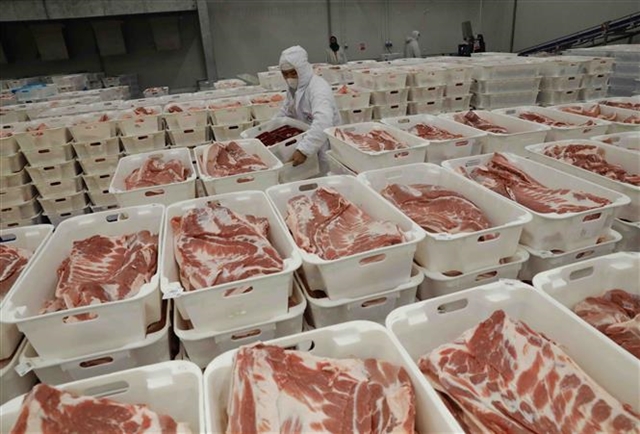Vietnam Vinh Viet Securities Joint Stock Company (VDSC) noted that Vietnam’s meat market will have a compound annual growth rate (CAGR) of 4.4% between 2018 and 2023.

Hanoi – The speed of development of modern supermarkets and the popularity of refrigerated meat in public consumption concepts are the key to unlocking the long-term potential of the market, which also brings opportunities for stock investment in the industry.
In a recent report on the outlook for Vietnam’s chilled meat market, VDSC noted that Vietnam’s meat market is growing at a compound annual growth rate of 4.4%, driven mainly by beef, goat and chicken.
This is closely related to people’s increased attention to health, the rise of the fitness trend and the trend of reducing the intake of fat and cholesterol-rich foods.
Between 2024 and 2028, the analyst unit predicts that the beef and goat meat markets will continue to play a leading role due to low per capita consumption, coupled with a recovery in tourism, attracting tourists from countries whose food culture is more closely associated with this type of meat.
Meanwhile, pork or poultry consumption is close to the saturation level of per capita consumption, which is similar to regional countries with similar food cultures such as China, Thailand, the Philippines, Laos and Cambodia.
According to Euromonitor research cited by VDSC, despite growth in consumption of newer meats such as beef and goat, it is not enough to make up for the saturation of pork and poultry consumption, and the meat market is expected to slow down between 2024 and 2028, with a compound annual growth rate of only 4.1%.
Despite the limited market growth potential mentioned above, VDSC still observes increased investment and new entrants in the meat market by major players, including Vissan (VSN), MeatDeli (Masan MEATLife, MML), Hoang Anh Gia Lai (HAG), Hoa Huat Group, CP and Vilico, among others.
This is attributed to the potential for a shift in consumption from “hot meat” to chilled meat, which is packaged and sold for a long period by reputable companies.
More specifically, hot meat is mainly sold in markets with unknown origins, while chilled meat is sold in supermarket chains by reputable companies with more regulated packaging and production methods.
Compared with traditional markets, the development of modern supermarket channels will promote the expansion of the chilled meat industry.
In addition, consumers are gradually realizing that refrigerated meat is healthier than hot meat and its origin is more clear.
According to Euromonitor data, by 2023, Vietnam’s consumption of frozen meat will be as low as 9%, while in China this proportion reached 40% in 2017.
However, VDSC found that the market still faces bottlenecks that hinder the release of potential.
The first is the consumption of hot meat, which is closely linked to long-standing traditional markets. Many consumers, especially those of Generation X, are still accustomed to buying hot meat without refrigeration, and such products are sold in ubiquitous market stalls.
Second is the selling price. Vietnamese chilled meat producers have to maintain a complex cost structure from operating production plants, feed imports and breeding costs to storage systems, packaging and discount costs at modern retail outlets.
Therefore, to ensure profitability, finished products are usually sold at prices higher than the market average.
In addition, due to fierce competition in the refrigerated meat market and insufficient market share, many companies have fallen into the dilemma of low income and thin profits in recent years.
When making investment decisions, investors should also pay attention to the market share development of supermarket systems related to these producers, such as Co.op Mart (Vissan), Bách Hóa Xanh, Go!, Lan Chi (CP, G), and Winmart (MML); due to fierce competition, meat brands are usually only distributed in their own specific supermarket chains.
The VDSC report also pointed out that companies that focus on selling chilled meat (such as MML or VSN) generally have higher gross margins than companies that wholesale pork (such as BAF and DBC) because the cost structure of packaging and selling chilled meat in supermarkets is higher than the costs of distributing it to small merchants, such as personnel expenses and sales support.







